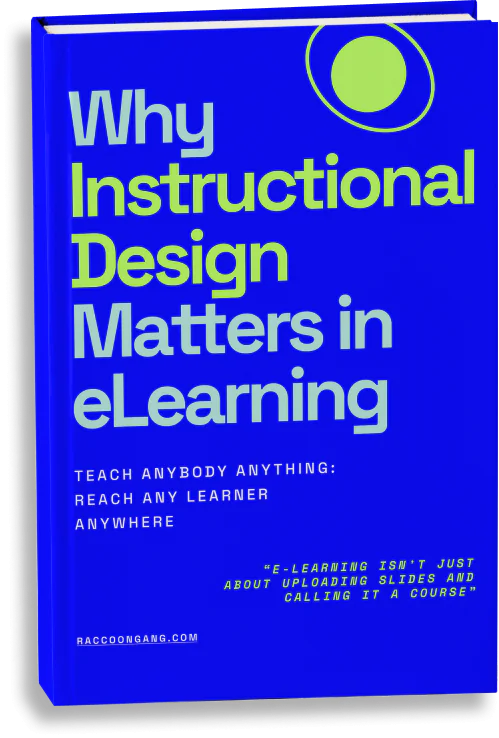When we recently spoke with our Head of HR about how to boost employee performance across teams, our corporate LMS quickly became the center of the conversation. We realized how much a modern LMS for corporate training management can shape learning, productivity, and long-term growth. In this article, we’ll explore how a corporate LMS for training and development directly influences company specialists’ performance and what to keep in mind when implementing one in your organization. Understanding the features and benefits of a corporate LMS can transform the learning experience. A well-implemented corporate LMS becomes the launchpad for AI in corporate training, from automated recommendations to the future of employee learning analytics.
What is a Corporate LMS?
An LMS for corporate training is a tool for managing and delivering employee training. The main advantage of such platforms for organizations is that they have a learning hub at their disposal. Imagine a space where all training materials, manuals, etc., are structured and always available for online learning.
Different Types of Corporate Training LMS Platforms
- Cloud-based LMS – It runs online, so employees can access training when they want.
- Self-hosted LMS – Installed on a company’s servers. As a result, the company gets complete control over security and customization.
- Enterprise LMS – When the organization needs to train a lot of people across different teams and departments, it chooses this option.
- Extended Enterprise LMS – Same as the previous option, used for employee training, but at the same time, it offers opportunities for customer, partner, or vendor training.
And for delivering the right software stack, see our article on the best employee training software for 2025.
How It’s Different from the Traditional Learning Approach
Old-school training methods involve long in-person sessions, printed materials, and endless PowerPoint slides. A corporate LMS is about digitalization — and much more.
- Employees can access courses from their devices whenever it’s convenient.
- No need to book a bigger training room (also, think about how much the organization will save on coffee and snacks ☕).
- Assign courses, track progress, and generate reports without manual work.
- AI and analytics help customize training based on individual skills and needs.
- Get insights to see what’s working well and where you should make improvements.
How a Corporate LMS Makes Training Easier
With an employee training LMS for corporates, companies can ditch outdated training methods and make learning flexible and practical.
| The Problem with Traditional Training | How an LMS Fixes It |
| Training is tied to a schedule – Employees have to be in a specific place at a specific time. | Train faster – Courses are available on any device, whenever it works best. |
| Too expensive – Travel costs, printed materials, and instructor fees add up fast. | Saves money – No need for travel, paper, or expensive trainers — everything’s online. |
| Inconsistent learning – Training depends on the instructor, which means quality can vary. | Same high-quality content for everyone – Employees get the same excellent training, no matter where they are. |
| Tracking is a nightmare – HR and managers have to manually check who’s completed what. | Automatic tracking & reports – See progress in real time, spot skill gaps, and make smarter decisions. |
| Hard to scale – More employees mean more training sessions, more scheduling, and more hassle. | Grows with your company – Easily train more people without extra workload or costs. |
“If we consider factors such as travel, classroom setup, and downtime, we can say that implementing corporate LMS solutions leads to significant time savings of 40–60%.” — Head of HR, Raccoon Gang.
The Benefits of Corporate LMS
Let’s also look at the benefits that lie “between the lines.” These benefits are not immediately obvious but play a crucial role in the long-term success of any learning and development initiative.
- Increased Efficiency. With a centralized platform for training delivery, employees can access learning materials whenever they want. As a result, learners can progress at their own pace. Moreover, employees acquire knowledge and skills with minimal disruption to their daily work. Does the organization benefit from this? Absolutely.
- Improved Performance. Modern learning platforms provide built-in capabilities for adaptive learning. When employee training activities are related to responsibilities and career advancement, every specialist tries a little harder.
- More Than Just Statistics. How do you determine how valuable a training session was and whether the printed training materials were clear to most learners? Of course, you can run a survey. But let’s be honest — this takes extra time, and the answers won’t always be objective. Meanwhile, a corporate LMS provides online analytics in real time.

Key Features of a Corporate LMS
Let’s explore the main features that make a corporate LMS an indispensable tool for organizations.
Content Management
Content management is a core component of a corporate LMS. A comprehensive content management system allows administrators to upload various types of content, such as documents, presentations, videos, and interactive modules. It provides a centralized repository for learning resources.
- Centralized repository for learning resources.
- Easy organization, delivery, and updating of training materials.
- Support for various content types: documents, presentations, videos, and interactive modules.
- Structured learning pathways and version control.
User Management
Management functionality within a corporate LMS is essential for effective training administration and tracking individual learner progress. With user management capabilities, organizations can easily segment learners into groups based on departments, roles, or training requirements.
- Creation and management of user profiles.
- Assignment of training courses and personalized learning paths.
- Monitoring of individual learner progress and performance.
- Segmentation of learners into groups based on departments, roles, or training requirements.
Reporting and Analytics
Reporting and analytics capabilities provide valuable insights into learner performance, training effectiveness, and overall training program ROI. Administrators can generate reports and analytics dashboards showcasing key metrics such as course completion rates, assessment scores, and learner engagement levels.
- Generation of reports and analytics dashboards.
- Key metrics tracking: course completion rates, assessment scores, learner engagement.
- Identification of knowledge gaps and evaluation of training effectiveness.
- Data-driven decision-making to optimize future learning strategies.
Best LMS for Corporate Training
If you are ready to implement a corporate LMS, you definitely want to choose one that fits your needs perfectly. Let us help you out — check out the top-five list compiled by our professionals based on their extensive experience in the field and see for yourself which one will fit you better, depending on your scale, budget, and learning goals.
Open edX LMS
Open edX® is a powerful, open-source platform that’s often used as an enterprise LMS by organizations wanting flexibility and control. You can host it yourself (or via a vendor) and customize features, making it ideal when you want the platform to grow with your company rather than be constrained by fixed templates.
Moodle Workplace
Moodle Workplace is built on the familiar Moodle core but tailored for corporate needs. As an enterprise LMS, it supports multi-tenancy, advanced reporting, and flexible role hierarchies, so you can segregate training by division, region, or partner network without losing control.
Docebo
Docebo positions itself as a “learning experience platform,” but in practice, it behaves as a mature enterprise LMS. It’s smart with AI-driven recommendations, integrates well with other HR and business tools, and handles large numbers of learners with ease — a solid choice when you expect to scale quickly.
SAP Litmos
SAP Litmos is a SaaS enterprise LMS designed for straightforward deployment and maintenance. It shines when you want dependable “turnkey” functionality: built-in content libraries, compliance learning, and mobile access, all backed by SAP’s reputation for enterprise support.
Absorb LMS
Absorb LMS is known for its intuitive design and scalability, making it a reliable enterprise LMS for organizations focused on learner engagement. Its automation features simplify administration, while detailed analytics give managers clear visibility into learning progress and outcomes — a strong mix of ease and insight.
Each of these platforms brings something different to the table, but all can operate as a solid enterprise LMS. When choosing, weigh your priorities: customization or ease of setup, integration with your existing systems, scalability, and cost. With the right fit, your corporate training infrastructure becomes a strategic advantage — not just another tool.
Best LMS for Corporate Training (New block)
It can be difficult to select the best LMS for corporate training. Numerous platforms are available, and they all guarantee improved performance and learning. We’ve selected a number of tried-and-true solutions that function well as an enterprise LMS for businesses of various sizes and sectors to make things simpler.
The platforms listed below all support contemporary learning formats, reporting, and integrations—all of which are necessary components of an enterprise learning management system (LMS) to maintain efficient and well-organized training.
Open edX
An open-source enterprise LMS called Open edX offers businesses a great deal of flexibility and control. If you want to create a unique learning environment, accommodate a lot of students, and link your training to HR, CRM, or other business tools, it’s a perfect fit. As your business changes, you can expand and modify your training ecosystem with Open edX as your enterprise LMS.
Docebo
Docebo is an enterprise LMS driven by AI that aims to improve the personalization and engagement of learning. It is well-liked by businesses that conduct extensive training for partners, staff, and clients. You can automate learning paths, evaluate outcomes, and make ongoing improvements to your training programs by utilizing Docebo as an enterprise LMS.
Absorb LMS
A cloud-based enterprise LMS called Absorb LMS was created to make corporate learning, compliance, and certifications easier. L&D teams can see what’s working and where learners need more support thanks to its clear interface and robust reporting. Absorb LMS is an enterprise LMS that is ideal for businesses looking for organized, trackable training without a complicated setup.
SAP
An enterprise learning management system (LMS) called SAP SuccessFactors Learning has close integration with the larger SAP HR ecosystem. For multinational corporations that already use SAP and seek learning data related to performance, talent, and compliance, it’s a solid choice. Organizations can directly connect training to people processes and business outcomes by using it as an enterprise LMS.
Cornerstone OnDemand
Cornerstone OnDemand is an enterprise learning management system that integrates talent management, learning, and skills. Large organizations that must manage various audiences, geographical areas, and career paths within a single system will find it especially helpful. Cornerstone OnDemand is an enterprise LMS that facilitates ongoing skill development rather than just one-time training sessions.
TalentLMS
TalentLMS is an enterprise LMS that is simple to use and ideal for small and mid-sized businesses. It’s perfect for onboarding, product training, and basic compliance because it’s quick to roll out and simple for administrators and learners to use. TalentLMS can be a useful first enterprise LMS for expanding companies that maintain training organization without requiring a lot of implementation work.
Why Your Organization Needs a Corporate LMS
Businesses across industries have used LMS platforms for various purposes, but the main ones include streamlining training, boosting employee performance, and cutting down costs. Let’s analyze examples of how companies can benefit from corporate training LMS adoption.
A Tech Company Scales Training Across 10+ Offices
A growing tech company struggled with training employees across multiple locations. Their solution? A cloud-based LMS. Results:
- 50% faster onboarding for new hires
- 80% of employees completed compliance training on time
A Healthcare Provider Improves Compliance
A hospital network needed to ensure all medical staff were up to date on compliance regulations. With a self-hosted LMS, they created custom training modules with built-in assessments. Results:
- 30% fewer procedural errors within the first year
- Training time reduced by 40%
A Retail Chain Boosts Sales
After switching to an AI-powered LMS, the retail brand automated product training and personalized learning paths. Results:
- Training costs dropped by 60%
- 15% increase in sales due to better product knowledge
Success Story by Raccoon Gang
Among our projects, one standout example is the solution we developed for leading training provider Salmon Thrust. The main goal was to create a custom training management system to streamline the delivery of corporate training courses for various organizations. Result:
- We built a platform that allows organizations to manage team training, organize course catalogs, and monitor the learning progress of each team or individual learner.
Getting Started with Raccoon Gang Corporate LMS
At Raccoon Gang, we keep the process under control from the initial consultation to the development of an LMS for corporations, launch, and beyond.
- Discovery Session.
- Needs Assessment.
- Solution Design.
- Development.
- Content Migration.
- Testing and Quality Assurance.
- Training and Onboarding.
- Support and Maintenance.
- Continuous Updates.
Remember, whether you are implementing a corporate LMS for the first time or migrating from an existing system, Raccoon Gang is here to guide you every step of the way.
→ You can always use our SaaS LMS for Online Courses. We developed it specifically to help you launch your own compliance course or training quickly.







